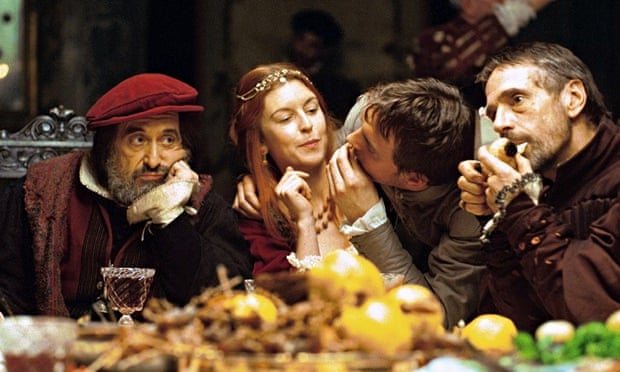And forgive us our trespasses,
As we forgive them that trespass against us.
Or:
'And forgive us our debts, as we also have forgiven our debtors.
Or:
and forgive us our sins, for we ourselves forgive everyone who is indebted to us.
Most Bible translations use the word "debts" in the Lord's Prayer, so why do we say "forgive us our trespasses"? | Catholic Answers
In other words, the language of debt is mixed up with the language of religion:
The Theology of Debt
Episode 4 of 10
▶ BBC Radio 4 - Promises, Promises: A History of Debt, The Theology of Debt
Debt: The First 5000 Years - Wikipedia, the free encyclopedia
How about some Shakespeare.
The Merchant of Venice | Royal Shakespeare Company | Theatre
The Merchant of Venice 2004 - YouTube
With a nice little summary here:
The Merchant of Venice Summary by Shmoop - YouTube
Why the Merchant of Venice is on the money
In a time of anxiety about debt, the latest RSC production about to be screened in cinemas strikes a nerve. Yet the play also warns against the language of money infecting our lives and loves

As a tale of debt mercilessly pursued, The Merchant of Venice, it seems, will always be topical. In planning new productions at the Globe in the spring and theRSC this summer – the latter to be broadcast live in cinemas on 22 July – theatrical producers didn’t necessarily have the battle between Greece and the EU in mind. But they did know the UK was going to have a general election that would largely focus on the right way to manage the country’s money. Shakespeare’s play, of course, is all about money. But more specifically, it is all about the danger of allowing ideas associated with money to reign over our non-economic lives.
A few years ago, I saw Al Pacino playing Shylock in an open-air production in New York’s Central Park. The scenery-chewing eccentricity of Pacino’s performance turned out to be a compelling match for his outcast character, but the production’s most striking aspect was the ironic weight the actors gave to all the financial metaphors that Shakespeare deploys in the love plot. Bassanio’s pursuit of Portia is first announced as his scheme “to get clear of all the debts I owe”, because Portia is rich. He refers to Portia’s famed “worth”, and calls her a “rich” “gem”. He marvels: “Look on beauty, / And you shall see ’tis purchas’d by the weight.” And while Shylock demands the fulfilment of the “bond” that Antonio signed, the pledged lovers twitter happily about “love’s bonds”, and Graziano speaks of the “bargain” of their faith. At the end, Portia tells Antonio that he is going to be Bassanio’s “surety”, to guarantee his faithfulness.

It seemed obvious, in that production’s aftermath, that Shakespeare was satirising the commercialisation of love relations, the infection of ordinary life by money-talk. Yet most critics – including the editor of the Arden Shakespeare edition, John Russell Brown – have assumed that the Portia story represents a redemptive and happy version of finance, shown to be harmonious with true love. There seems an awful lot of room to doubt this interpretation. For example, Portia promises to pay off Antonio’s debt and then says: “Since you are dear bought, I will love you dear.” Alexander Pope thought this line unworthy of Shakespeare, but Brown calls it “a joyful acknowledgement of the pleasures of giving for love”. Yet it’s surely a deliberately uncomfortable echo of Shylock’s reference, in the trial scene, to his “dearly bought” pound of flesh.
After the game of rings in the play, the Arden editor concludes: “Love is not like merchandise; it is not simply a question of possessor and possessed.” This is nice to think, but it sounds more like Brown’s uplifting moral than Shakespeare’s. At the outset, Bassanio has announced his scheme to marry Portia with the words: “I have a mind presages me such thrift / That I should questionless be fortunate.” Thrift means mercenary profit in particular (Shylock refers to his own “well-won thrift”) as well as success more generally; while Bassanio’s “fortunate” is the kind of pun a man makes with dollar signs in his eyes.
Not only romantic love but friendship, too, is metaphorically securitised in this play, as when Bassanio says: “to you Antonio / I owe the most in money and in love”. (Note that the cash debt is mentioned before the love debt.) For his part, Antonio says to Salarino: “Your worth is very dear in my regard.” There does not seem sufficient rhetorical quarantine established between these usages and Shylock’s naked announcement of a deliberate trade (“To buy his favour, I extend this friendship”) to keep the former as innocent as a sunnily redemptive interpretation of the play would wish.
The Merchant of Venice also plays on the semantic doublings (relatively recent at the time) of terms such as “interest” and “credit”. “Interest” was curiosity, or a legal claim to something, before it became the mechanism by which money breeds more money, and “credit” was belief. And so, for instance, Bassanio’s greeting, “Lorenzo and Salerio, welcome hither, / If that the youth of my new int’rest here / Have power to bid you welcome” is sardonically echoed by Shylock, referring to “my well-won thrift, / Which he [Antonio] calls interest”. And Antonio’s announcement that he will “go forth / Try what my credit can in Venice do … ” is mirrored by Portia’s instruction to Bassanio to “swear by your double self, / And there’s an oath of credit”.
The historian Quentin Skinner argues, in his classic 1974 essay “Some Problems in the Analysis of Political Thought and Action”, that the emerging merchant class deliberately adopted such virtuous terms to describe their own activities. And this has had long and arguably noxious effects ever since. In Hamlet, the hero expresses his ennui at one point by declaring: “How weary, stale, flat, and unprofitable seem to me all the uses of this world … ” The word “profitable” meant advantageous in a general sense before it acquired its financial meaning of “lucrative”, about 100 years later. (The root, “profit”, is from the Latin for progress or benefit.) When Hamlet says the uses of the world seem “unprofitable” to him, he is not complaining that he can’t figure out a way to get rich quick. But once the term “profitable” was adopted for the meaning of “offering financial gain”, it tended to imply something that we might not want to take for granted: that only what is “profitable” in the monetary sense is “profitable” in the general sense of useful or beneficial.
Centuries later, our ordinary language today is shot through with economic metaphor. And the effect might be to encourage our thoughts to run along certain rails rather than others. For an exclusively economic definition of the good is often built into our speech. Take, for instance, the term “investment”. This originally meant simply the putting on of clothes, or the clothes themselves. But then it acquired a financial sense, in the dealings of the East India company in the 17th century. And now “investment” is one of those primarily financial terms that is also morally inflected in a positive way: “investment” is distinguished from “speculation”, which is supposed to be mere reckless gambling; it is prudent and wise and good for everyone. (In fact, “speculation” itself meant scientific observation or hypothetical reasoning before it acquired a disapproving financial sense in the late 18th century.)
We also, after all, use the term “investment” today when we’re not talking about money. We might say something is a good “investment” of time, or energy. But the financial crisis has reminded us that, as they say in the small print, the value of your investment can go down as well as up. And anyway, isn’t it strange, when you think about it, to speak of investing time? When you invest time in something, you don’t get that time back at a later date, with added interest. The time is gone, whatever you did with it.
Instead we sometimes talk about “spending” time. (In Merchant, Antonio mildly rebukes Bassanio thus: “You know me well, and herein spend but time / To wind about my love with circumstance.”) But still, as with investing time, “spending” time conceives of time as a currency. The implication that mere moment-to-moment existence is a transaction, and that you expect to get something from it, might imply a strange way to live.
Another metaphorical currency in our language is attention. “Pay attention.” All right, perhaps I’ll “pay” attention, but I’m going to want something in return. The danger is that conceiving of matters of the intellect as transactions might lead to a certain impatience, a sense of entitlement, or even a more general instrumentalisation of reason. If education, for example, has no “payoff” – if it’s not going to be “profitable” in the commercial sense – why should anyone pursue it?
When we talk meanwhile about the “payoff” of a piece of writing or a work of art, we’re implicitly constraining the field of our evaluation to the instant effect, the immediate reaction. That way, we risk elevating the merely sensational over the more ambiguous or deep. This seems to be clear if we imagine asking the question: “So, what’s the payoff of virtue ethics; what’s the payoff of Beethoven’s Ninth or The Tempest?” Just to ask the question seems a little … well, cheap.
“Cheap”, of course, is another economic metaphor that we often use in an unexamined way. To equate an intellectually unrigorous idea or a morally shabby act – “what you did was really cheap”, or “that was a cheap shot” – with a commodity whose price is low certainly works to the benefit of people who want to sell us commodities at high prices. As Skinner points out, the term “commodity” itself meant convenience or benefit before it was hijacked to describe a thing to be bought and sold. Hence another pun in The Merchant of Venice, where Antonio warns: “For the commodity that strangers have / With us in Venice, if it be denied, / Will much impeach the justice of the state”.
We are now plainly living in what the writer FS Michaels calls an “economic monoculture”, where an economic definition of success is the dominant “story” – it’s what rules our lives, not just at work but in our relationships, and our ideas of education, health, and so forth. The economic metaphors of our everyday conversation are part of the invisible substructure of this monoculture, and tend to undermine attempts to rewrite the dominant story.
English, they say, is fast becoming or has already become the global lingua franca. And English is infested with ossified metaphors from finance. Embedded within our language are innumerable attitudes to money and work that are at the very least arguable, or ought to be argued for explicitly. If we wish to rethink our political economy in whole or in part, it will help to make sure that our language is not betraying us as we speak.
• The RSC production of The Merchant of Venice is broadcast live in cinemas on 22 July. onscreen.rsc.org.uk.
Why the Merchant of Venice is on the money | Stage | The Guardian
.
.
.




